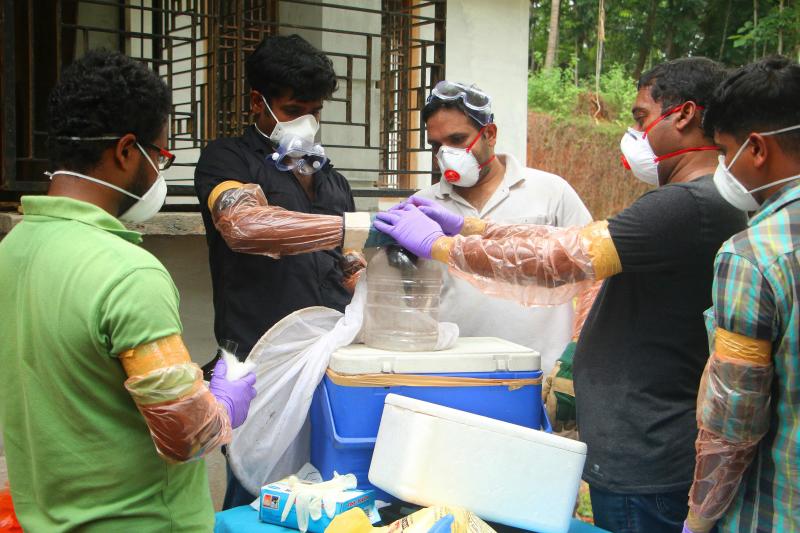Rare brain-damaging Nipah virus kills 10 in India, prompts rush to hospitals
Sign up now: Get ST's newsletters delivered to your inbox

Animal Husbandry department and Forest officials deposit a bat into a container after catching it inside a well at Changaroth in Kozhikode in the Indian state of Kerala on May 21, 2018.
PHOTO: AFP
Follow topic:
BENGALURU/KOCHI (REUTERS/AFP) - A rare virus spread by fruit bats, which can cause flu-like symptoms and brain damage, has killed 10 people in southern India, health officials said on Tuesday (May 22), with at least two more cases being monitored.
Infectious disease outbreaks can be a challenge in the world's second most populous country, where infection control and surveillance are weak, leading to hundreds of deaths annually from diseases such as mosquito-borne dengue.
There is no vaccine for the Nipah virus that has broken out in Kerala state. It can cause encephalitis, or inflammation of the brain, the World Health Organisation (WHO) says. The usual treatment is supportive care.
The first death happened on Friday (May 18) in the district of Kozhikode, said Ms K.K. Shailaja, health minister of the state, a magnet for tourists.
"This is a new situation for us. We have no prior experience in dealing with the Nipah virus," said Ms Shailaja. "We are hopeful we can put a stop to the outbreak."
Of 18 people screened for the virus, 12 came back positive, she told a news conference, adding that 10 of them had died, with the other two being monitored closely.
Three of the victims, members of the same family, are suspected to have been infected by bats that crowded a well near their home, said a local government official, Mr U. V. Jose.
"We have closed the well and evacuated the people living nearby," said Mr Jose, adding that federal health officials who visited the area were investigating.
The deaths had sparked concern among residents, he added.
"A large number of people affected by fever, and even minor ailments, are swarming to hospitals, fearing they have contracted the disease," Mr Jose said. "We've sought the help of private hospitals to tide over the crisis."
Health surveillance has been stepped up across Kerala, the state's health secretary Rajeev Sadananda told Reuters.
The virus has killed more than 260 people in Malaysia, Bangladesh and India in outbreaks since 1998. India's eastern state of West Bengal has suffered two outbreaks in the last decade, killing 50 people, the WHO has said.
The WHO has named Nipah as one of the eight priority diseases that could cause an epidemic, alongside Ebola and Zika.
A nursing assistant in Kerala who died after treating Nipah patients has been hailed as a hero by authorities.
Mother-of-two Lini Puthussery was cremated even before her family members could bid a final goodbye because of fears that the virus could spread.
In a final note she scribbled in a hospital isolation unit, Ms Puthussery urged her husband to take care of the children.
"I don't think I will be able to see you again. Sorry. Please take care of our children," she said.
Kerala state Chief Minister Pinarayi Vijayan said that Ms Puthussery's "selfless service will be remembered".
Health authorities across the state were on high alert, setting up medical camps and a control room to tackle the emerging situation.
The neighbouring state of Tamil Nadu has stepped up surveillance in border districts fearing the spread of Nipah.
Nipah was first identified in Malaysia in 1998. It spread to Singapore and more than 100 people were killed in both places. On that occasion, pigs were the virus hosts but they are believed to have caught it from bats.
In India, the disease was first reported in 2001 and again six years later, with the two outbreaks claiming 50 lives.
Both times, the disease was reported in areas of the eastern state of West Bengal bordering Bangladesh.
Bangladesh has borne the brunt of the disease in recent years, with more than 100 people dying of Nipah since a first outbreak was reported in 2001. In 2004, humans became infected with Nipah after eating date palm sap that had been contaminated by fruit bats.

